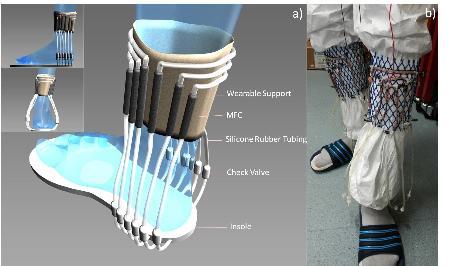Urine-powered wearable energy generator

Researchers at the of the Bristol BioEnergy Centre at the University of the West of England (UWE Bristol) have used microbial fuel cell technology to develop a wearable energy generator.
A pair of socks embedded with miniaturised microbial fuel cells (MFCs) and fuelled with urine pumped by the wearer’s footsteps has been used to power a wireless transmitter to send a signal to a PC. This is claimed to be the first self-sufficient system powered by a wearable energy generator based on microbial fuel cell technology.
Soft MFCs embedded within a pair of socks were supplied with fresh urine, circulated by the human operator walking, in a lab-based experiment led by Professor Ioannis Ieropoulos.
Normally, continuous-flow MFCs would rely on a mains-powered pump to circulate the urine over the microbial fuel cells, but this experiment relied solely on human activity. The manual pump was based on a simple fish circulatory system and the action of walking caused the urine to pass over the MFCs and generate energy.
Soft tubes, placed under the heels, ensured frequent fluid push-pull by walking. The wearable MFC system successfully ran a wireless transmission board, which was able to send a message every two minutes to the PC-controlled receiver module.
“Having already powered a mobile phone with MFCs using urine as fuel, we wanted to see if we could replicate this success in wearable technology. We also wanted the system to be entirely self-sufficient, running only on human power — using urine as fuel and the action of the foot as the pump,” said Professor Ieropoulos.
“This work opens up possibilities of using waste for powering portable and wearable electronics. For example, recent research shows it should be possible to develop a system based on wearable MFC technology to transmit a person’s coordinates in an emergency situation. At the same time, this would indicate proof of life since the device will only work if the operator’s urine fuels the MFCs.”
Microbial fuel cells (MFCs) use bacteria to generate electricity from waste fluids. They tap into the biochemical energy used for microbial growth and convert it directly into electricity. This technology can use any form of organic waste and turn it into useful energy without relying on fossil fuels, making this a valuable green technology.
The centre has recently launched a prototype urinal in partnership with Oxfam that uses pee-power technology to light cubicles in refugee camps.
Exploring grid security in a high-renewables era
Australian researchers have identified critical technical, regulatory and economic issues that...
Hallett battery project launched in SA
Owned and developed by EnergyAustralia, the Hallett BESS will be built alongside the existing...
Echandia to supply battery system for Singaporean tugboat
The agreement with the Swedish company is part of an ambitious plan to electrify Singapore's...





